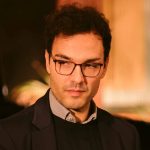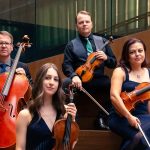95 Years to Speak to Our Time: Building Bridges through Music
Arts Empowering Life, Arts & Entertainment Lecture Series
Samuel Adler, lecturer-interviewee.
Format: live-stream; on-demand (30 days)
Release Date: January 13, 2024
Duration: 1:14:54
Karl Henning | 18 JAN 2024
On Saturday, January 13, Arts Empowering Life launched the debut season of its Arts and Entertainment Lecture Series from the new state-of-the-art Performing Arts Center building in Brewster, Massachusetts, on Cape Cod, with a broad invitation for people to view the lecture online in real-time, or on-demand for 30 days following. (The YouTube video link is embedded below.)
In this live-streamed video lecture, 95-year-old composer, conductor, and educator Samuel Adler spoke of his family, origins, and experiences through a long and genuinely extraordinary life.
After graduating from the University of Köln with a Master’s Degree in composition and piano in 1921, Adler’s father Hugo was appointed the second Cantor (of five) of the Hauptsynagoge in Mannheim, the city where his son Samuel would be born in 1928. The Hauptsynagoge was a substantial building and institution, served by four rabbis and with a sanctuary seating 1500. Looking over the music in use, Adler père found the harmonies “Mendelssohnian but not as good.” He did some reharmonizations of the familiar tunes. The congregation did not appreciate the musical novelty and complained to the Board. Hugo was told to lay off or be dismissed. Hugo fell for and married the beautiful daughter of a Board member.
In an illustration of “like father, like son” (partial, anyway, as no nuptials would be involved), when Sam was a student at Boston University many years later, he was relieved as conductor of both an orchestra and choir, for programming (in the case of the orchestra) new music and (in the case of the choir) practically any music which was not Messiah or The Seasons. In both cases, sit-out strikes by the musicians in support of the young conductor resulted in his restoration to the podium.
It is a rich pleasure to hear the composer, Sam Adler, obviously intelligent, broadly cultivated, and warmly humane, retail the events and experiences of the years.
There is the perforce dramatic story of his experience of Kristallnacht, which I forbear to summarize, not that the story is not amply worth telling, but because the composer himself tells it incomparably better than could I.
Reflective of that story is the titular work and center of musical gravity of the 2022 all-Adler compact disc from Gloria Dei Cantores, To Speak to Our Time, a cantata that the Dresden Chamber Choir commissioned to commemorate the 80th anniversary of Kristallnacht, and there is, of necessity, the profound emotional impact of such a piece composed by a man who experienced the event as a ten-year-old boy.
The commissioning ensemble, under their conductor Hans-Christoph Rademann, gave the première, which took place at the Frauenkirche in Dresden, a reconstructed cathedral that had been destroyed during the fire-bombing of the city during World War II. It had its American première in New York City with the NY Virtuosi conducted by Herold Rosenbaum just before the pandemic.
The program of the compact disc flows somewhat like an Order of Service opening and closing with traditional hymns (Leoni—a traditional Christian adaptation of the Jewish hymn Yigdal, dating to the 15th century—and “Amazing Grace.”) There are a number of settings of biblical texts for choir and organ, very attractively written, and in a style which would be not at all out of place in (say) an Anglican Evensong.
Of the texts for To Speak to Our Time, the composer writes:
There are a prelude and interludes for a pair of violins (as a boy, Adler took up the violin.) In total, the composition and performance are exquisite. ■
EXTERNAL LINKS:
- Samuel Adler: samuelhadler.com
- Arts Empowering Life: artsempoweringlife.org

Read more by Karl Henning.
RECENT POSTS
 Atlanta Chamber Players mark 50th anniversary with Casarrubios world premiere and chamber classics • 11 Feb 2026
Atlanta Chamber Players mark 50th anniversary with Casarrubios world premiere and chamber classics • 11 Feb 2026 Michele Allegro wins Garth Newel International Composition Competition; ‘Rush’ to premiere in July • 10 Feb 2026
Michele Allegro wins Garth Newel International Composition Competition; ‘Rush’ to premiere in July • 10 Feb 2026





.png)